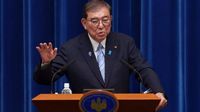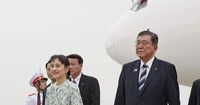On April 27, 2025, Japanese Prime Minister Shigeru Ishiba embarked on a significant diplomatic mission to Southeast Asia, beginning with a visit to Vietnam. This trip comes at a critical time as the region navigates increasing tensions and economic challenges, particularly in light of recent U.S. tariff measures.
Upon arrival at Noi Bai International Airport in Hanoi, Ishiba was welcomed by officials and proceeded to engage in discussions aimed at strengthening bilateral ties. His visit includes a scheduled meeting with Vietnamese Prime Minister Pham Minh Chinh on April 28, where the two leaders are expected to address pressing issues concerning security and trade.
In a statement made before his departure from Haneda Airport, Ishiba highlighted the impact of U.S. tariff measures on Japanese companies operating in Vietnam and the Philippines. "The United States' tariff measures have a major impact on Japanese companies operating in both countries. I want to hear the opinions and concerns of Japanese companies on the ground and use them to help shape our country's policies regarding Trump's tariffs," he said.
This diplomatic mission holds particular significance as it unfolds against a backdrop of shifting geopolitical dynamics in Southeast Asia. With China's assertive actions in the South China Sea raising alarms, Ishiba's discussions will also focus on enhancing security cooperation between Japan and Vietnam. The Prime Minister stated, "There are attempts by China to unilaterally change the status quo by force. We want to further strengthen cooperation regarding security."
During his visit, Ishiba is set to meet with not only Prime Minister Chinh but also with the top leaders of Vietnam, including Communist Party General Secretary To Lam. This engagement aims to solidify Japan's stance as a key partner in the region, particularly in light of the uncertainty surrounding U.S. involvement in Southeast Asian affairs.
On April 29, Ishiba will continue his diplomatic efforts by visiting the Philippines, where he will meet with President Ferdinand Marcos Jr. This meeting is critical as Japan seeks to position itself as a stabilizing force in the region amid growing concerns about Chinese influence.
In addition to security discussions, the leaders are expected to explore avenues for economic cooperation, particularly in trade and investment. Ishiba's agenda includes addressing the implications of U.S. tariffs on Japanese businesses and strategizing on how to mitigate these effects.
The Prime Minister's visit to the Thang Long Industrial Park in Hanoi prior to his meetings with senior officials underscores his commitment to understanding the local business environment. Engaging directly with Japanese companies operating in Vietnam, Ishiba aims to gather insights that will inform Japan's approach to the ongoing trade challenges posed by the U.S.
Experts have noted that Japan's proactive engagement in Southeast Asia is crucial as countries in the region reassess their alliances and partnerships in response to China's growing assertiveness. Ishiba's trip is seen as an opportunity to reinforce Japan's role as a reliable ally and a counterbalance to China's influence.
As Ishiba continues his Southeast Asia tour, the outcomes of these meetings will likely shape Japan's foreign policy in the region moving forward. The discussions on security cooperation and economic collaboration are not merely about immediate concerns but also about laying the groundwork for a resilient partnership that can withstand future challenges.
With the backdrop of increasing tensions in the South China Sea and the complexities of U.S.-China relations, Ishiba's mission underscores Japan's strategic interests in maintaining stability and fostering economic growth in Southeast Asia. The Prime Minister's efforts to engage with regional leaders reflect a broader commitment to enhancing Japan's influence and ensuring a cooperative approach to shared challenges.
As the situation in the region evolves, the implications of Ishiba's discussions with Vietnamese and Philippine leaders will be closely monitored by analysts and policymakers alike. The outcomes could have lasting effects on Japan's diplomatic relationships and economic strategies in Southeast Asia.
In conclusion, Prime Minister Ishiba's visit to Vietnam and the Philippines represents a pivotal moment for Japan as it seeks to navigate the complexities of regional security and economic cooperation amidst rising tensions with China and the challenges posed by U.S. tariff policies.






